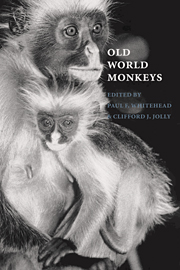Book contents
- Frontmatter
- Contents
- List of contributors
- Preface
- 1 Old World monkeys: three decades of development and change in the study of the Cercopithecoidea
- 2 The molecular systematics of the Cercopithecidae
- 3 Molecular genetic variation and population structure in Papio baboons
- 4 The phylogeny of the Cercopithecoidea
- 5 Ontogeny of the nasal capsule in cercopithecoids: a contribution to the comparative and evolutionary morphology of catarrhines
- 6 Old World monkey origins and diversification: an evolutionary study of diet and dentition
- 7 Geological context of fossil Cercopithecoidea from eastern Africa
- 8 The oro-facial complex in macaques: tongue and jaw movements in feeding
- 9 Evolutionary morphology of the skull in Old World monkeys
- 10 Evolutionary endocrinology of the cercopithecoids
- 11 Behavioral ecology and socioendocrinology of reproductive maturation in cercopithecine monkeys
- 12 Quantitative assessment of occlusal wear and age estimation in Ethiopian and Tanzanian baboons
- 13 Maternal investment throughout the life span in Old World monkeys
- 14 Cognitive capacities of Old World monkeys based on studies of social behavior
- 15 The effects of predation and habitat quality on the socioecology of African monkeys: lessons from the islands of Bioko and Zanzibar
- 16 The loud calls of black-and-white colobus monkeys: their adaptive and taxonomic significance in light of new data
- 17 Agonistic and affiliative relationships in a blue monkey group
- 18 Locomotor behavior in Ugandan monkeys
- 19 The behavioral ecology of Asian colobines
- Index
1 - Old World monkeys: three decades of development and change in the study of the Cercopithecoidea
Published online by Cambridge University Press: 08 October 2009
- Frontmatter
- Contents
- List of contributors
- Preface
- 1 Old World monkeys: three decades of development and change in the study of the Cercopithecoidea
- 2 The molecular systematics of the Cercopithecidae
- 3 Molecular genetic variation and population structure in Papio baboons
- 4 The phylogeny of the Cercopithecoidea
- 5 Ontogeny of the nasal capsule in cercopithecoids: a contribution to the comparative and evolutionary morphology of catarrhines
- 6 Old World monkey origins and diversification: an evolutionary study of diet and dentition
- 7 Geological context of fossil Cercopithecoidea from eastern Africa
- 8 The oro-facial complex in macaques: tongue and jaw movements in feeding
- 9 Evolutionary morphology of the skull in Old World monkeys
- 10 Evolutionary endocrinology of the cercopithecoids
- 11 Behavioral ecology and socioendocrinology of reproductive maturation in cercopithecine monkeys
- 12 Quantitative assessment of occlusal wear and age estimation in Ethiopian and Tanzanian baboons
- 13 Maternal investment throughout the life span in Old World monkeys
- 14 Cognitive capacities of Old World monkeys based on studies of social behavior
- 15 The effects of predation and habitat quality on the socioecology of African monkeys: lessons from the islands of Bioko and Zanzibar
- 16 The loud calls of black-and-white colobus monkeys: their adaptive and taxonomic significance in light of new data
- 17 Agonistic and affiliative relationships in a blue monkey group
- 18 Locomotor behavior in Ugandan monkeys
- 19 The behavioral ecology of Asian colobines
- Index
Summary
Introduction
In 1969, John and Prue Napier brought together researchers from a variety of fields with the intention of examining the systematics of a relatively neglected primate taxon – the Old World monkeys. After a week of intensive discussion, the revised presentations were collated and published in 1970 as Old World Monkeys: Evolution, Systematics, and Behavior (henceforth “OWM I”). The conference was noteworthy in that it marked a new phase in the study of the cercopithecoid monkeys, as a taxon meriting detailed attention in its own right.
The present volume was conceived as a tribute to the initiators and editors of OWM I, now, sadly, both deceased. We have aimed to bring together a collection of papers to exemplify important, currently active areas of research on cercopithecoid monkeys. Every scientific work is a product of a unique time and context. This is as true of this volume as it was of OWM I 1970. We therefore use this introductory chapter as a comparison between the two books to illustrate some of the paradigm shifts and (if we dare use the word) progress that has marked evolutionary primatology over the past three decades.
At the beginning of the 1970s, the cercopithecoid monkeys were, for many anthropologists, important as the “poor relations” of the hominoid primates in general, and the human species in particular.
- Type
- Chapter
- Information
- Old World Monkeys , pp. 1 - 28Publisher: Cambridge University PressPrint publication year: 2000
- 1
- Cited by



